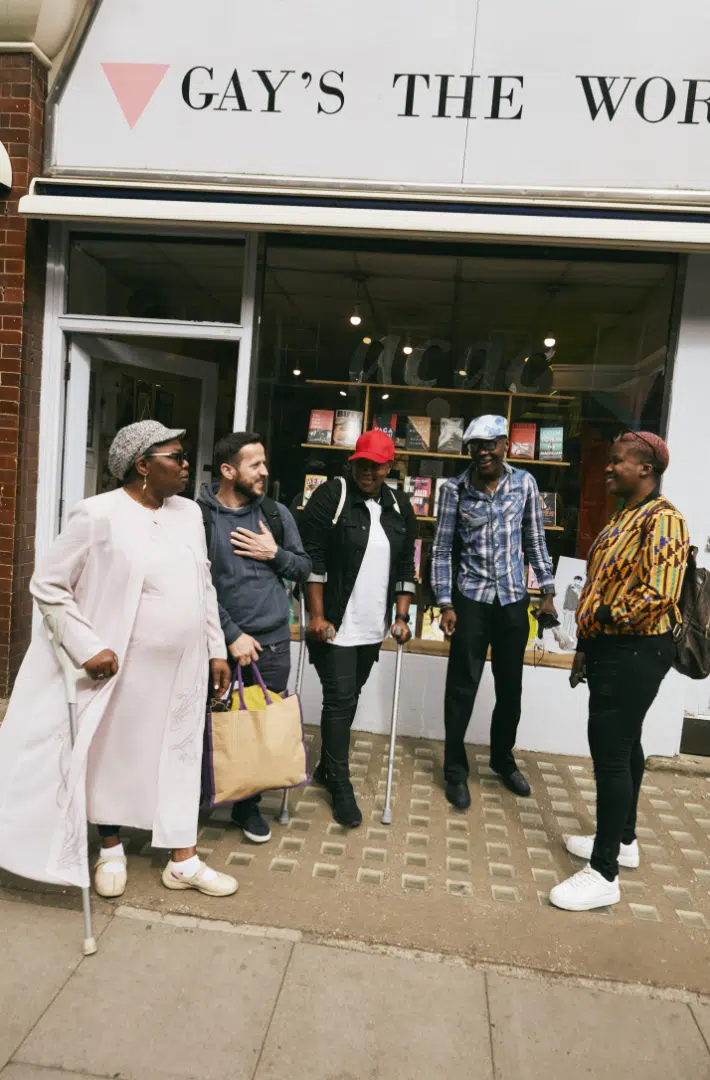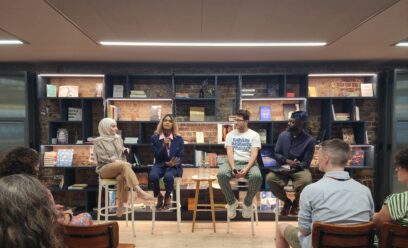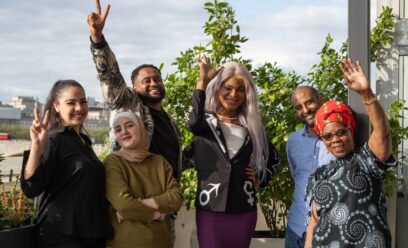#PrideInSeekingSafety – LGBTQI+ refugees seeking safety from violence and persecution share their stories
Posted by Ahmed Elmi on June 27, 2022
Credit: IMIX/Kasia Clark
#PrideInSeekingSafety
For Pride month, we invited five queer sanctuary seeking people to the world-famous Gay’s The Word bookshop in London’s King’s Cross, to highlight the importance of safe spaces for queer people, and to raise awareness about the plight of LGBTQI+ people who have refugee status around the word. Each of the ambassadors comes from the almost 70 countries around the where being LGBTQI+ is still illegal. We were also joined by Rainbow Migration, who are highlighting the increasing threats to LGBTQI+ asylum in the United Kingdom, as deportation and detention becomes a harsh reality for many queer people seeking safety.
LGBTQI+ Ambassadors
The ambassadors in this campaign each have a unique experience of the system, as well as escaping some harsh realities in their respective home countries. From fleeing family and community violence to sleeping rough on the streets and being placed in detention, these resilient queer people have a story worth telling. One that reacquaints us with the original ethos of ‘Pride’ and why it still resonates in 2022.

Credit: IMIX/Kasia Clark
Nessakem
Nessakem is from Nigeria and living in Manchester.
‘’I came to the UK on a tourist visa, I was meant to be exploring and applying to universities for my masters. I did apply and got an offer but whilst I was doing those rumours about me were flying around the internet. My parents disowned me when I had to tell my truth because there was already evidence of me being a lesbian.
I came out to my mum, she said horrible things to me, my friends from back home sent me mean texts as well.
At this point, I knew it was not safe, I sought advice from Citizen’s advice, and I was told to apply for asylum.
This is how my asylum process began, it was a lonely process, I was struggling with not having a job or being allowed to work, struggling with the fact that I also had to hide my sexuality in the given accommodation by the Home Office because I was put with people from other countries who were not queer or queer friendly.
It was a struggle but I’m glad that I can proudly say I am a lesbian woman and be at peace with myself.”

Credit: IMIX/Kasia Clark
Hamez
Hamez is from Albania and now lives in Newcastle:
“I originally came to the UK as a minor in 2002, I was 15. I told the interpreter that I was gay then, but he ignored my statement, and they did not record my asylum as a LGBT refugee, but that I was just fleeing the war. After that I was deported, but I came back in 2012 to claim asylum as a queer person seeking safety.
It was very scary to go back to Albania. My family were pressuring me to get married, and when my parents found out that I was gay, my father chased me out of the house with an axe. I had brought shame on my family, and my father began to be physically abusive. I was hiding in the mountains, trying to find a way to escape my village. It is common for people to get beaten up or killed in my country if someone is found out to be gay.
When I eventually got here, I was sleeping rough and one night, after going out with some friends, police stopped me on the street and put me in a detention for nearly 3 months for being undocumented. Being in the UK, you still face racial and xenophobic remarks, even homophobia.
Pride is important to me because it allows me to be my full self. I am not longer afraid of anything. I have met a lot of people in the UK who have been incredibly supportive of me.
I was born as a gay person, and I wear that with pride.”

Credit: IMIX/Kasia Clark
D
D is from Nigeria and now lives in Middlesbrough, she would prefer to use the pseudonym: ‘D’
“I came to the UK in 2000, fleeing safety from my life in Nigeria. Back home in Nigeria you cannot imagine to be public about your life as an LGBT person. You live in hiding. When people find out what you are, or who you are, your life begins to become difficult.
You face this even from your own family. I was running away from being beaten and sent to prison for up to 15 years. I moved from place to place until I eventually came to the UK.
When I claimed asylum in the UK, I had a lot of issues with the Home Office believing that I was a lesbian. Because they were unconvinced, they put me in detention for 11 months, where I was interrogated and pushed around.
I now have a nice life in the Northeast, with the support of great people and queer organisations like Hearts Gables. We all relate to each other as a family.
I am proud to be myself. No one can tell me who I am, or what I have experienced. More people need to speak out about what is happening to LGBT people around thew world. Also, more people need to speak out about what is happening to LGBT asylum seekers in this country.
When people tell you who they are, believe them.”

Credit: IMIX/Kasia Clark
Jason
Jason is from Trinidad and Tobago and now lives in Doncaster.
“I came to the UK iin 2014, felling violent homophobia in my country. Living openly in Trinidad and Tobago is not easy, there are routine killings of homosexual men and women, as well as transgender people.
I was active in the queer community back home, and when people found out about me, they decided to make my life difficult. I was incredibly sad to leave my home, it was not an easy decision, but I had to do it to stay alive.
When I arrived in the UK, life was extremely hard. I was sleeping rough in the streets of southeast London for a while, under a bridge Deptford. I am now settled in Doncaster.
I had always thought once I was able to live freely and speak my mind, then I could eventually help others in my position.
In coming to this country and having my rights, I want to use the experience I have gained as an activist and go back to Trinidad and Tobago, whenever I get the opportunity, and to push forward new legislation that will hopefully usher social change for the next generation.
I am now happy that I do not have to defend myself for simply being myself.”

Credit: IMIX/Kasia Clark
Sheila
Sheila is from Zimbabwe and now lives in Selby
“I came to the UK in 2008. The political issues surrounding LGBT people back home are very volatile.
I was under 18 when I came here, and I had to struggle to convince the UK government that I was a lesbian, they refused to believe me. I had to reapply for asylum a few times because of this.
Even though I told them about the situation in Zimbabwe and how dangerous it is for queer people, the Home Office told me that I can go back to my country and hide my sexuality. That way I would not have a problem. They actually told me that.
It is not safe at all in Zimbabwe. There are raids and arrests that happen all the time. You must live in fear, in secret and hide. How long can someone keep be hiding?
Although there’s still homophobia in the UK, I like the fact that I do not have to hide anymore. I feel accepted, and I can be myself.
I am proud of who I am, and I am proud to be a lesbian.”
Pride
Despite the extreme obstacles still facing LGBTQI+ people around the world, it is important to never lose sight of the original purpose of Pride: to promote the dignity, equality and visibility of queer people. And although many of the fights for queer liberation have been won for the citizens of the United Kingdom, we should never neglect those that are most vulnerable and in need of our support.
Gay’s the Word
Gay’s the Word is the oldest queer bookshop in the United Kingdom that was founded in 1979 in London’s Bloomsbury, near King’s Cross. It is a historic place for the Gay Liberation Movement in the UK, as many activists groups in the early days of the fight for queer rights took meetings inside the bookshop, including the famous Lesbian and Gays Support the Miners. Historically, it has often been one of the first places many queer people visit as they migrated to London from other parts of Britain and across the world.
“Queer migration is a part of our history, and we endeavour to be a safe welcoming space and to serve as a beacon to those coming from cultures where it is not easy or possible to be who you are.”
Jim MacSweeney, Manager at Gay’s The Word Bookshop
Rainbow Migration
LGBTQI+ people that seek safety in the UK have had to flee violence and persecution in their countries of origin. Once they get here, they expect to feel safe and to have a chance to rebuild their lives free from violence. However, instead of that, most of them encounter a long and often cruel asylum process in which their sexual orientation and/or gender identity is called into question. It also sends them to temporary accommodation and detention centres where they can face further abuse and isolation.
“As we go out and celebrate this month, let us also try to reflect on how our freedom is tied to the freedom and liberation of others, and that we are not entirely free when some of us are locked up while seeking safety from persecution.”
Qussai Ramzi is a member of Rainbow Migration’s Campaigns Advisory Group
Rainbow Migration supports lesbian, gay, bisexual, trans, queer and intersex (LGBTQI+) people through the asylum and immigration system.
Support
Rainbow Migration gives free and confidential legal advice to LGBTQI+ people seeking asylum. They also provide emotional support to those who are going through the asylum process and help them with accessing housing and health services. If you need support, please get in touch.
LGBTQI+ people fleeing persecution are scared and need Rainbow Migration’s services more than ever. Can you make a donation to support someone seeking asylum? £5.50 pays for someone to attend one of our support groups, £15.70 pays for an hour of one-on-one support
If you’d like to learn more about the work that Rainbow Migration does, feel free to subscribe to their newsletter.
Add your name to call for an end to LGBTQI+ detention here: Handraiser



